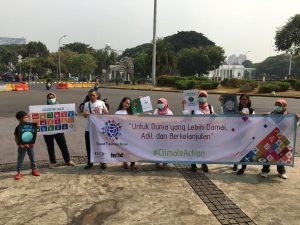The Key to Improving Human Rights, Climate Resiliency, and Land Use in Indonesia: Collaboration
A conversation with Daniel Oscar Baskoro, Partnership Advisor at the International NGO Forum on Indonesian Development (INFID).
This is the third interview in our Climate Crisis, Global Land Use, and Human Rights Interview Series. Read the other interviews with BHRRC and LiKEN.
The climate crisis threatens to drastically alter people’s relationships with the land on which they rely. Meanwhile, many climate solutions are themselves land-intensive: solar and wind energy, carbon dioxide sequestration, and finding places for people displaced by climate change to live and grow food. The result is an ever increasing competition for land, as well as governance and justice challenges that are both intractable and inextricably linked.
On September 27th, 2019, Columbia Center on Sustainable Investment (CCSI), Sabin Center for Climate Change Law, Landesa, and Wake Forest Law School hosted a day-long conference on the intersection of the climate crisis, global land use and human rights. This series of blog posts turns to experts and key stakeholders in relevant fields to offer their perspectives on relevant challenges, gaps, and solutions at the nexus of these issues.
In this interview, Daniel Oscar Baskoro, Partnership Advisor at the International NGO Forum on Indonesian Development (INFID), discusses transdisciplinary collaboration as a necessary means to addressing the challenges and solutions at the intersection of climate change and human rights.
1. How does your work relate to climate change, land-use and/or human rights?
The International NGO Forum on Indonesian Development (INFID) is a national non-governmental organization platform working with over 68 active member organizations across Indonesia to initiate policy studies, monitoring and advocacy. Many of the organizations that we work with exist at this intersection of environmental and human rights issues such as Walhi (Friends of the Earth Indonesia) and Bina Desa (Indonesian Secretariat for the Development of Human Resources in Rural Areas).
Currently, INFID has three programs relating directly to climate change: Reducing Inequality, Implementation of the Sustainable Development Goals (SDGs), and Human Rights and Democracy. The SDGs program works to make mainstream sustainable development that centers people, planet, prosperity, and partnership. Under the Human Rights and Democracy program, the Business and Human Rights subprogram promotes the implementation of the UN Global Compact Principles, to prioritize respect for human rights and the environment within the Indonesian business sector. Additionally, INFID currently manages a project, with support from Oxfam and SIDA (Swedish International Development Agency), to promote women’s economic empowerment as a strategy to build climate change resilience in the shrimp aquaculture industry.
2. Within the nexus of the climate crisis, land use and human rights, what do you see as the biggest issues?
Much of INFID’s work is at the intersection of these topics, but our focus is primarily on addressing human rights issues; we understand that improving human rights positively contributes to environmental and land use issues. For example, while our objective may be to secure decent livelihoods for women working in the shrimp aquaculture sector, we are simultaneously promoting climate change resiliency among a population that is most vulnerable to its effects. In an effort to address that, we push for private companies working in shrimp aquaculture to respect human rights and the environment, to guarantee the sustainability of life around the company site as well as sustainable production for their business. To guarantee a sustainable business process, stakeholders need to pay attention to land and environment carrying capacity.
3. What strategies or solutions are you pursuing to address these issues? And what are the main hindrances you face?
One of the greatest challenges in addressing climate, land, and human rights issues is that many of the parties working at this intersection––be it governmental agencies, civil society organizations, or private sectors––often work in silos and do not adequately coordinate with one another. Thanks to the 2030 Sustainable Development Agenda which necessitates multi-stakeholder collaboration, we are seeing improvement, however, we are still far from where we need to be. Given this gap, INFID is working to promote multi-stakeholder engagement between the national government (ministries and agencies), local governments, civil society organizations, private sectors, and others (philanthropy) in achieving the 2030 Sustainable Development Agenda.
4. If you held the microphone on a world stage, what would you ask of your fellow colleagues—be it activists, lawyers, climate scientists, etc.—working on the issues of the climate crisis, land tenure, and/or human rights?
In Indonesia, most stakeholders still view these as separate issues that are not connected. Therefore, the solutions produced by the government, activists, climate scientists, and so on are partial and do not comprehensively address the problem. The root causes of these issues are interconnected, and so too are the solutions. These challenges threaten the very lives of human beings. And while it is important we work together within our respective expertise, it is essential we have cross-disciplinary collaboration to address our common problem. We must collaborate, and we must do so now.
More information on the September 27th Climate Crisis, Global Land Use, and Human Rights conference is available here.

